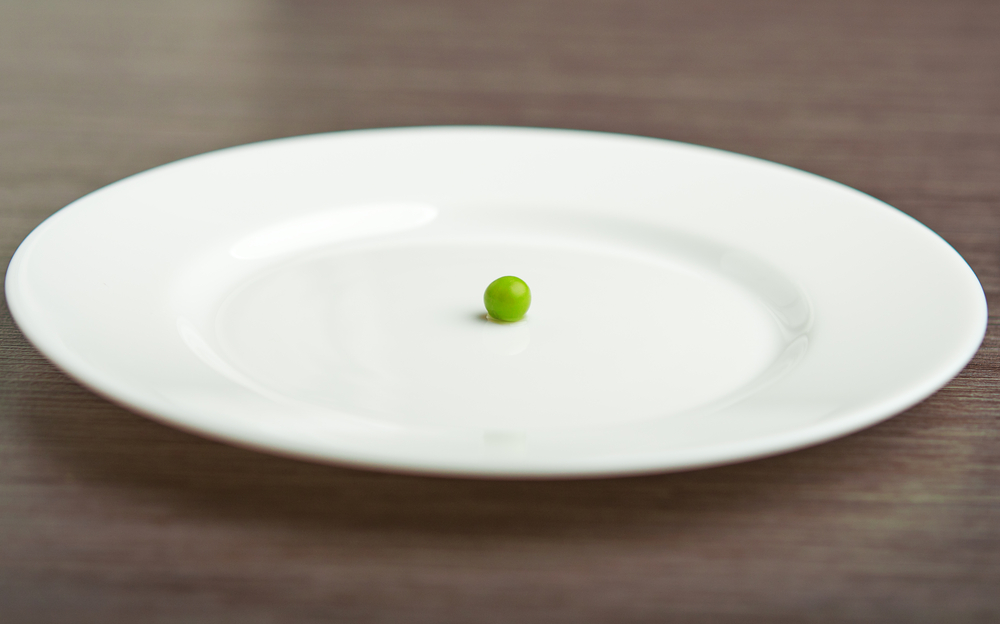
It was a Saturday morning and we’d slept too late; that was the crux of it. Emily wanted pancakes, but wouldn’t let me make them, or make them herself, or go out to get them from the diner across the street. She just folded herself deeper and deeper into her bathrobe — my wife is a small woman who likes to be noticed least when she’s upset — and just said, “Breakfast is over.” She started to cry. “Breakfast is over, breakfast is over, breakfast is over.”
Emily Milsham is a genius. She has one terminal degree in art history and is working on a second, both from top-tier universities. She drags the lazy, privileged shits in her packed-to-capacity undergraduate classes kicking and screaming into the beautiful worlds created by Picasso and Rembrandt and Robert Mapplethorpe (and let me tell you, I would not do that for those students, because they do not fucking deserve it. I speak once a semester in her classes and I brought my last lecture to a dead halt just so I could tell one of the little bastards to stop talking to his buddy as though I wasn’t even in the room) and at the end, they thank her for it. She is funny as hell, a sparkling conversationalist, a good Christian, and incredibly fun to go to bed with. She has a chili pepper on her RateMyProfessor page, and that chili pepper is absolutely correct.
Emily was also a ballet dancer starting at age two and a half; her mother is not an intentionally mean person, but her daughter baffles her and she has spent most of Emily’s life trying to make her do one thing or another, usually successfully. Until a year or two ago she would send Emily “care packages” of diet bars and clothes that were too small; Emily has always tried to play them off as though they were no big deal but you can’t keep abject misery from showing up in your eyes even if you keep your face still.
It’s worth noting, although I hesitate to say it, that my mother-in-law, Enid, is overweight. She is a very fun, rambunctious, upbeat old lady and I like her a lot, but she is heavy past the point of euphemism and it obviously is one of the few things in her life that she can’t control. It makes her very unhappy. For most people who are not her daughter, she’s really fun, but Enid knows bone-deep that fat people are unhappy and she doesn’t want her daughter to be unhappy, therefore she will do anything she can to keep her from being fat. Emily is not fat, therefore she must be happy. QED. Emily’s brother, Tom, has mostly gotten out of dealing with his mother’s expectations by doing exactly what he wants all the time, and while this strategy doesn’t exactly win him friends, it does keep his mother off his back. He’s not fat, either. Emily is much more anxious to please, or better yet, to do a good enough job to avoid being noticed.
Men know absolutely nothing about ballet dancers. I think most of us start off thinking that it’s probably a hop, skip and a jump to more interesting kinds of dancing, but actually ballet is about exercising total, utter control over your body, and for a woman constantly bullied and coerced into pleasing someone else, control becomes an end, rather than a means. Ballet becomes about being cussed enough to hold your arms in a goddamn port de bras without shaking until the music is over and not an eighth of a note less. It puts you into conflict with the one person who is always letting you down, fucking up, and keeping you from getting what you want: yourself. And when you win, you force your body to do what you tell it to do and the reward is acclaim from other people.
I suppose you could describe any physically taxing sport this way, but ballet dancers are a breed apart. Their rituals are, even for sportspeople, punishing and masochistic, and the practice and drills required to master the routines usually cause the practitioners to fall apart. They are to tennis pros and football players as SEALs are to the rest of the Navy. I’m not exaggerating — ballet dancers plie, they go en pointe, they generally do things no human being should do to her body, and 95% of those bodies pay the price in repetitive stress injuries like tendonitis and damage to soft tissues like cartilage; shin splints; labral tears; and, of course, the ever-present eating disorders. Their toenails fall out all the time. That is fine with many of the dancers I’ve met in my life, because these dancers hate their bodies very much.
Emily, obviously, has an eating disorder. It is neither anorexia nor bulimia because it includes symptoms considered exclusive to both and is instead categorized under the heading “eating disorder—other.” Food stresses her out. We have spent literally 45 minutes in a restaurant batting away increasingly brittle waiters as politely as possible until she can figure out what to order; on more than one occasion, the waiter has snapped at us and we’ve just had to get up and leave because people start to stare, which makes Emily even more nervous than she already is.
The leaving utterly mortifies her; one of Emily’s darkest nightmares is that she would be a bother to someone, but even worse than that is the feeling, in her words, that “if I get fat again, I’ll die.” I used to think she was being hyperbolic until I finally realized that she really did think she’d die if she gained five pounds — not of anything specific, just of being fat. Again, my wife is freakishly smart. She knows people don’t die from gaining five pounds. But she is certain, though she knows intellectually that this is not the case, that she will be the exception.
Emily was never fat in the first place — she was curvier in high school and lost a lot of weight through starving herself so badly that she could tell exactly how much she could eat before she blacked out. As with ballet, she was able to make her anxieties work for her. Many people in her life have done very cruel things to Emily — a boyfriend who humiliated her for fun a long time ago, a stalker when we were at school together, regular unkind words from her mother along the way — and whatever rage she feels, she turns inward, into the kind of brutal punishment you wouldn’t inflict on a rabid dog. She treats her body like a lump of particularly stubborn clay; pain is merely proof that the sculpting process is working. She can fit into a pair of skinny jeans now, and she can buy designer clothes if she saves her teacher’s salary, and she likes the way she looks.
But she can’t order takeout after 8 p.m., because she gets tired and the stress of fatigue pushes her that crucial few inches over the precipice into recursion and terror and paralytic anxiety.
She is terrified to go to church because she’s afraid someone will talk to her. She hates to eat with anyone besides me, and even then, although we’ve eaten nearly every meal together for five years and change, she has to know what I’m ordering, and if it’s a salad, she has to get a smaller salad. If it’s a steak, she has to get a smaller steak. She’s happiest when we’re sharing, which makes me happy, too.
The eating disorder is just a manifestation of deep, unshakable fear: that she’ll never be good enough, that she’ll never live up to the standards set for her, that she’s somehow ugly in a part of herself no one else can see, and that fear, actually, is eating her; consuming her from the inside out.
Some nights she literally wakes up screaming, her voice hoarse from disuse during sleep but still in that desperate register reserved for fires and murders.
Still, Emily is getting better. She ate a dish of chicken curry from our local Thai restaurant in front of me the other day; I have had to restrain the urge to cheer because she can’t stand for me to draw attention to anything she eats or doesn’t eat. It’s been weeks since I’ve had to beg her to eat something — anything — for dinner. She hasn’t bought an issue of fucking, fucking, fucking “Cosmopolitan” (“Are Your Boobs Uneven? You’re Not Alone”) in a while and we got drunk and ate a whole bag of marshmallows together after Valentine’s Day. Some of this is simply Emily being Emily; she’s extremely stubborn and wants to get better. Some of it is that it finally got around to Enid that she’d been hurting her daughter rather than helping her. She sends boxes of cake mix and crackers now, which Emily rolls her eyes at, but isn’t hurt by.
It was recently National Eating Disorder Awareness Week, which five years ago I would have called the stupidest thing I could think of. It’s a psychiatric disease that affects upper-middle-class white girls — who gives a shit? Well, I suppose I do. It really messes people up. It is horrible beyond description, and ladies, it’s one of the worst things your partner will ever deal with short of fatal disease.
Many women already deal with eating disorders; others are in the early throes of anorexia or bulimia or some permutation thereof and “just trying to lose weight” or some other excuse. Here’s the thing: an eating disorder is not a part-time occupation. The name fits much better than whoever wrote the DSM-IV entry probably intended: it is an eating disorder in the sense that it disrupts your ingestion of food, but it is also a disorder that devours. It devours you, and it will devour your loved ones if you let it. If you understand only one thing from reading this, please understand that an eating disorder is not something you do to yourself; it is like suicide in that it constantly tells everyone who loves you that their opinion of you is worthless, and you don’t care what they think. Unlike suicide, it is reversible. Antidepressants, antianxiety drugs, good old-fashioned therapy and occasionally tough-love inpatient treatment can work wonders, and ultimately, you will be the person you’re supposed to be. Trust me, you are not supposed to be the person you are becoming when you purge, exercise until you pass out or see spots on an empty stomach, or eat half an apple for dinner. That person is dead.
You are probably somebody’s dream girl. There is a good chance that there are magazines, websites and blogs devoted to people who look exactly like you — the variety of male desire is equaled only by its enthusiasm. My wife is the best person I’ve ever met and the only thing she could ever do to make me happier with her body would be to gain ten pounds so that she doesn’t get lightheaded if she goes six hours without eating. I don’t want her to be Kate Upton — I don’t know what Kate Upton likes in bed and I don’t think she’d have much interesting to say about the George Bellows exhibition at the Met.
I’m writing this the day after the Oscars and I’m reading every possible variety of nasty thing said about the women on the red carpet, who are more or less what our society has to offer in the way of paragons of beauty; I understand that both men and women are hearing these things and that prejudices against women who don’t conform to an unattainable standard of beauty are much stronger and have much more real consequences for men than for women. But you have to believe someone who has watched it firsthand: the consequences of forcing yourself to conform to that standard are so much worse, and they will ultimately affect you and the people who love you the most. The hot little bitch at your office who makes fun of you for eating a sandwich; the older married guy who flirts with everybody but you; the manager-bro who’s only kidding about your weight — fuck those people. Their opinions don’t matter, and you don’t even like them. What you do for them, you take away from the people who love you the most.
That’s all I wanted to say. ![]()





